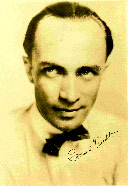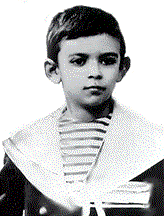
The Conrad Veidt Society
 Young Conrad Veidt (c. 1900)
Young Conrad Veidt (c. 1900)
I can see myself at school, a small anemic-
The operation was successful. My father was restored to health. The great
surgeon came to see him. My mother thanked him. Then........" And now, Herr Doktor,
what do we owe?" He looked down at my mother. "What can you pay ?" he asked sharply.
My mother looked at my father and he back at her. They knew that all they had was
about 150 marks, then worth about £7. The offer of such a small sum to a great surgeon
whose fees ran into hundreds of pounds seemed almost an insult. We have only about
one hundred and fifty marks, Doktor," said my father. "All right. Send it to me."
The great surgeon picked up his hat, said "Good day" and left the little house.
I know that he accepted that small sum out of respect and chivalry for my parents'
feelings. The man and his action had a great effect on me. From that day I determined
that I also would be a surgeon and go around healing the sick. I would model my
life on that of the great man who had saved my father's life. But, as it turned
out, I never became a surgeon. I was appalled at the amount of study necessary
in order to qualify in medicine, and gradually my desire was blunted by a keener
-
At the gallery entrance to the theatre there was a tall commissionaire with
a long white beard. We began to get to know each other. One night we talked. I
told him of my ambition. He offered to take me to see an actor named Albert Blumenreich,
who ran a school for stage aspirants in his spare time. We went. "This young fellow
wants to become an actor," he said. Herr Blumenreich smiled and looked me over deliberately.
"So," he said, " you want to be an actor; what can you do? Recite something to
me.' I knew 'Faust' by heart, and recited a few lines from the first act. I over-
Herr Blumenreich was silent for a few minutes. "You will have to pay something
for lessons," he said at last. I knew then that I had impressed him, because my,
commissionaire friend had told me that Blumenriech refused to take money from those
without promise. Alas! money was my great difficulty. I had practically no pocket-
There followed weeks of hard study at Herr Blumenreich's school. I neglected
my food and over-
Blumenriech followed me out of the room. "That was brilliant, Conrad, superb," he said, himself as excited as me. "You have impressed Max Reinhardt. I am sure you are going to be a great actor." He came to me later with a paper in his hand. It was a contract for work as an extra at the Deutsches Theatre. Fifty marks a month, about £2.10s. in English money. But I was an actor, an actor........
And then, of course, like every young man who dreams of fame, I decided to live my own life. If for the next few months I did not eat too often or too much, I was the happiest young man in Germany. If my mother had been good and kind to me before, now her goodness and kindness were doubled, trebled. She was unhappy about my leaving here but said no word of reproach. Her pride in me was boundless. She helped me with money, she was always there when I was in a jam, she gave me that inspirational comfort an artist and egotist needs. But, most important of all, she believed in me. She used to come to the theatre almost every night, where I used to stand holding something or walking on, in the crowd, just to watch me. She thought that I was already a great and important person,
My father died. It is still a deep regret to me this day that in choosing acting as my career I was forced to hurt him. He died too early to see I had done the right, the only thing. I was just a young man burningly ambitious, starting out on what I intended to be a great career, a little selfish, I suppose, and, of course, an egotist. I went on with my life, accepting as a matter of course the profusion of good things my mother lavished on me from the richness of her beautiful nature. She was a rock. Then I fell in love, properly in love, for the first time. She was a young actress, also playing extras, also studying at the Reinhardt School. She was very young, very lovely, and it was my first real romance. She lived outside Berlin, beyond a forest.
(Continued)
The Story of Conrad Veidt
SUNDAY DISPATCH, OCTOBER 1934